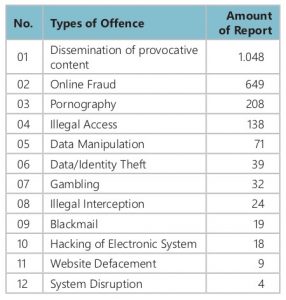- Home
- Capabilities
- ACTIO® Hub
- About Us
- Connect with Us
- AP Library
Indonesia is transitioning into the “New Normal”, with most businesses still applying work from home systems until the Covid-19 (Corona Virus) situation is better controlled. Working from home has resulted in employees relying heavily on the use of electronic devices. This has increased the likelihood of cybercrime occurring in the business community.
In this section, we are going to answer several questions regarding cybercrime cases in Indonesia during Covid-19 pandemic.
How many cybercrime cases were reported to the Police in the period of 2020?
The Number of cybercrime cases received by Directorate of Cyber Crime of National Police Criminal Investigation Department (Bareskrim Polri) in the period January 2020 to December 2020 is 2,259 cases, the figures obtained from a survey made by the official website owned by the Directorate of Cyber Crime of Bareskrim Polri called patrolisiber.id and databoks.katadata.co.id.
The statistics provided by patrolisiber.id and databoks. katadata.co.id show that out of 2,259 cybercrime cases, most involved the dissemination of provocative content. For your reference, we list below figures according to the classification of offence reported by complainants in the period of 2020.

What are the programs enforced by the police in response to the cybercrime cases in Indonesia?
On 19 February 2021, the Chief of the National Police Force of Republic of Indonesia issued Chief of Police Force Circular Letter Number: SE/2/11/2021 on Ethical Cultural Awareness to Realize Clean, Healthy, and Productive Indonesian Digital Space (SE Kapolri 2/2021). The issuance of SE Kapolri 2/2021 provides guidelines to investigators on the handling cybercrime cases.
SE Kapolri 2/2021 sets out list of practices and principles when dealing with cybercrimes and include:
What can a complainant do if they consider that their case is not showing any progress?
The complainant may submit a request Letter of Inquiry Progress (SP2HP) as regulated under Article 10 paragraph (5) to the Head of the National Police of the Republic of Indonesia Regulation Number 6 of 2019 on Criminal Investigation in conjunction with Article 11 paragraph (1) Head of the National Police of the Republic of Indonesia Regulation Number 21 of 2011 on Information Systems Investigation. YAN/MAD/HES


